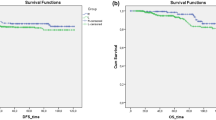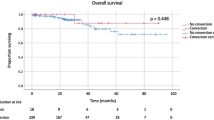Abstract
Background
The aim of this study is to explore the impact of the approach on conversion in patients undergoing minimally invasive restorative total mesorectal excision within a single unit.
Methods
A retrospective cohort study was conducted. Patients with rectal cancer undergoing minimally invasive restorative total mesorectal excision between January 2006 and June 2020 were included. Subjects were classified according to the presence or absence of conversion. Baseline variables and short-term outcomes were compared. Regression analyses were conducted to assess the relationship between the approach and conversion.
Results
During the study period, 318 patients underwent a restorative proctectomy. Of these, 240 met the inclusion criteria. Robotic and laparoscopic approaches were undertaken in 147 (61.3%) and 93 (38.8%) cases, respectively. A transanal approach was utilised in 62 (25.8%) cases (58.1% in combination with a robotic transabdominal approach). Conversion to open surgery occurred in 30 cases (12.5%). Conversion was associated with an increased overall complication rate (P = 0.003), surgical complications (P = 0.009), superficial surgical site infections (P = 0.02) and an increased length of hospital stay (P = 0.006). Robotic and transanal approaches were both associated with decreased conversion rates. The multiple logistic regression analysis, however, showed that only a transanal approach was independently associated with a lower risk of conversion (OR 0.147, 0.023–0.532; P = 0.01), whilst obesity was an independent risk factor for conversion (OR 4.388, 1.852–10.56; P < 0.00).
Conclusions
A transanal component is associated with a reduced conversion rate in minimally invasive restorative total mesorectal excision, regardless of the transabdominal approach utilised. Larger studies will be required to confirm these findings and define which subgroup of patients could benefit from transanal component when a robotic approach is undertaken.

Similar content being viewed by others
References
Heald RJ (1979) A new approach to rectal cancer. Br J Hosp Med 22:277–281
Fleshman J, Branda ME, Sargent DJ et al (2019) Disease-free survival and local recurrence for laparoscopic resection compared with open resection of stage ii to iii rectal cancer: follow-up results of the ACOSOG Z6051 randomized controlled trial. Ann Surg 269:589–595. https://doi.org/10.1097/SLA.0000000000003002
Stevenson ARL, Solomon MJ, Brown CSB et al (2019) Disease-free survival and local recurrence after laparoscopic-assisted resection or open resection for rectal cancer: the Australasian laparoscopic cancer of the rectum randomized clinical trial. Ann Surg 269:596–602. https://doi.org/10.1097/SLA.0000000000003021
Jeong SY, Park JW, Nam BH et al (2014) Open versus laparoscopic surgery for mid-rectal or low-rectal cancer after neoadjuvant chemoradiotherapy (COREAN trial): survival outcomes of an open-label, non-inferiority, randomised controlled trial. Lancet Oncol 15:767–774. https://doi.org/10.1016/S1470-2045(14)70205-0
Bonjer HJ, Deijen CL, Abis GA et al (2015) A randomized trial of laparoscopic versus open surgery for rectal cancer. N Engl J Med 372:1324–1332. https://doi.org/10.1056/NEJMoa1414882
Gouvas N, Georgiou PA, Agalianos C et al (2018) Does conversion to open of laparoscopically attempted rectal cancer cases affect short- and long-term outcomes? A systematic review and meta-analysis. J Laparoendosc Adv Surg Tech 28:117–126. https://doi.org/10.1089/lap.2017.0112
Furnée EJB, Aukema TS, Oosterling SJ et al (2019) Influence of conversion and anastomotic leakage on survival in rectal cancer surgery; retrospective cross-sectional study. J Gastrointest Surg 23:2007–2018. https://doi.org/10.1007/s11605-018-3931-6
Clancy C, O’Leary DP, Burke JP et al (2015) A meta-analysis to determine the oncological implications of conversion in laparoscopic colorectal cancer surgery. Colorectal Dis 17:482–490. https://doi.org/10.1111/codi.12875
Crippa J, Grass F, Achilli P et al (2020) Risk factors for conversion in laparoscopic and robotic rectal cancer surgery. Br J Surg 107:560–566. https://doi.org/10.1002/bjs.11435
Simillis C, Lal N, Thoukididou SN et al (2019) Open versus laparoscopic versus robotic versus transanal mesorectal excision for rectal cancer: a systematic review and network meta-analysis. Ann Surg 270:59–68. https://doi.org/10.1097/SLA.0000000000003227
Jiang HP, Sen LY, Wang B et al (2018) Pathological outcomes of transanal versus laparoscopic total mesorectal excision for rectal cancer: a systematic review with meta-analysis. Surg Endosc 32:2632–2642. https://doi.org/10.1007/s00464-018-6103-6
Brierley JD, Gospodarowicz MK, Wittekind C (2017) TNM classification of malignant tumours - 8th edition 73
Blikkendaal MD, Twijnstra ARH, Stiggelbout AM et al (2013) Achieving consensus on the definition of conversion to laparotomy: a Delphi study among general surgeons, gynecologists, and urologists. Surg Endosc 27:4631–4639. https://doi.org/10.1007/s00464-013-3086-1
Dindo D, Demartines N, Clavien P-A (2004) Classification of surgical complications. Ann Surg 240:205–213. https://doi.org/10.1097/01.sla.0000133083.54934.ae
Berriós-Torres SI, Umscheid CA, Bratzler DW et al (2017) Centers for disease control and prevention guideline for the prevention of surgical site infection, 2017. JAMA Surg 152:784–791. https://doi.org/10.1001/jamasurg.2017.0904
Penna M, Knol JJ, Tuynman JB et al (2016) Four anastomotic techniques following transanal total mesorectal excision (TaTME). Tech Coloproctol 20:185–191. https://doi.org/10.1007/s10151-015-1414-2
De Bono JA, Larach JT, Singh P et al (2021) Anastomosis following low anterior resection: does one size fit all? ANZ J Surg 91:775–778. https://doi.org/10.1111/ans.16442
Prete FP, Pezzolla A, Prete F et al (2018) Robotic versus laparoscopic minimally invasive surgery for rectal cancer: a systematic review and meta-analysis of randomized controlled trials. Ann Surg 267:1034–1046. https://doi.org/10.1097/SLA.0000000000002523
Wu Z, Zhou W, Chen F et al (2019) Short-term outcomes of transanal versus laparoscopic total mesorectal excision: a systematic review and meta-analysis of cohort studies. J Cancer 10:341–354. https://doi.org/10.7150/jca.27830
Ryan OK, Ryan ÉJ, Creavin B et al (2021) Surgical approach for rectal cancer: a network meta-analysis comparing open, laparoscopic, robotic and transanal TME approaches. Eur J Surg Oncol 47. https://doi.org/10.1016/j.ejso.2020.06.037
Hol JC, Burghgraef TA, Rutgers MLW et al (2021) Comparison of laparoscopic versus robot-assisted versus transanal total mesorectal excision surgery for rectal cancer: a retrospective propensity score-matched cohort study of short-term outcomes. Br J Surg 108:1380–1387. https://doi.org/10.1093/bjs/znab233
Wasmuth HH, Færden AE, Myklebust T et al (2019) Transanal total mesorectal excision for rectal cancer has been suspended in Norway. Br J Surg. https://doi.org/10.1002/bjs.11459
van Oostendorp SE, Belgers HJ, Bootsma BT et al (2020) Locoregional recurrences after transanal total mesorectal excision of rectal cancer during implementation. Br J Surg 107:1211–1220. https://doi.org/10.1002/bjs.11525
Lau S, Kong J, Bell S, Heriot A, Stevenson A, Moloney J, Hayes J, Merrie A, Eglinton T, Guest G, Clark D, Warrier S (2021) Transanal mesorectal excision: early outcomes in Australia and New Zealand. Br J Surg 12:214–219. https://doi.org/10.1093/bjs/znaa098
Hol JC, van Oostendorp SE, Tuynman JB, Sietses C (2019) Long-term oncological results after transanal total mesorectal excision for rectal carcinoma. Tech Coloproctol 23:903–911. https://doi.org/10.1007/s10151-019-02094-8
D’Andrea AP, McLemore EC, Bonaccorso A et al (2020) Transanal total mesorectal excision (taTME) for rectal cancer: beyond the learning curve. Surg Endosc 34:4101–4109. https://doi.org/10.1007/s00464-019-07172-4
Persiani R, Agnes A, Belia F et al (2020) The learning curve of TaTME for mid-low rectal cancer: a comprehensive analysis from a five-year institutional experience. Surg Endosc. https://doi.org/10.1007/s00464-020-08115-0
Flynn J, Larach JT, Kong JCH et al (2021) The learning curve in robotic colorectal surgery compared with laparoscopic colorectal surgery: a systematic review. Colorectal Dis. https://doi.org/10.1111/codi.15843
Author information
Authors and Affiliations
Contributions
Alexander Heriot, Satish Warrier and Jacob McCormick were amongst the surgeons who performed the procedures. Alexander Heriot and Satish Warrier administered the project and guided the research. José Tomás Larach, Joseph Kong, Julie Flynn, Timothy Wright, Peadar Waters and Helen Mohan constructed the database and performed the statistical analyses. José Tomás Larach, Joseph Kong, Julie Flynn, Timothy Wright, Peadar Waters and Helen Mohan wrote the main manuscript. All the authors contributed significantly with the text revisions and manuscript editing. All the authors approved the final version of the manuscript.
Corresponding author
Ethics declarations
Ethics approval
Institutional Review Board ethics approval was obtained from both sites. Reference numbers are PMCC-2021–252498 and EH-2021-688. Informed consent regarding the surgical approach was obtained from all the participants.
Conflict of interest
Satish Warrier is a proctor for Intuitive Surgical. The other authors declare that they have no conflict of interest.
Additional information
Publisher's Note
Springer Nature remains neutral with regard to jurisdictional claims in published maps and institutional affiliations.
Supplementary Information
Below is the link to the electronic supplementary material.
Rights and permissions
Springer Nature or its licensor (e.g. a society or other partner) holds exclusive rights to this article under a publishing agreement with the author(s) or other rightsholder(s); author self-archiving of the accepted manuscript version of this article is solely governed by the terms of such publishing agreement and applicable law.
About this article
Cite this article
Larach, J.T., Kong, J., Flynn, J. et al. Impact of the approach on conversion to open surgery during minimally invasive restorative total mesorectal excision for rectal cancer. Int J Colorectal Dis 38, 83 (2023). https://doi.org/10.1007/s00384-023-04382-0
Accepted:
Published:
DOI: https://doi.org/10.1007/s00384-023-04382-0




